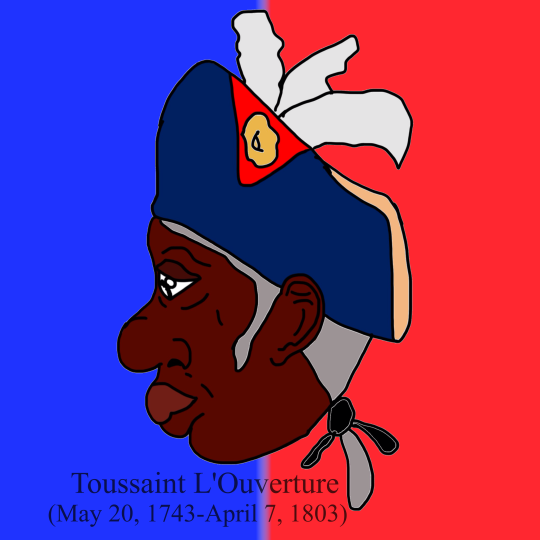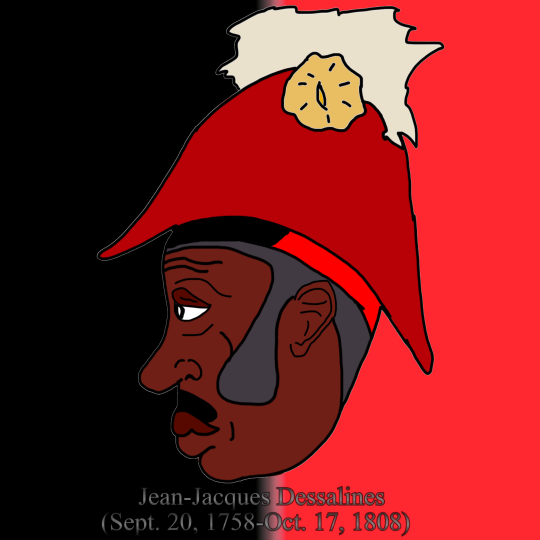#haitian revolution
Text
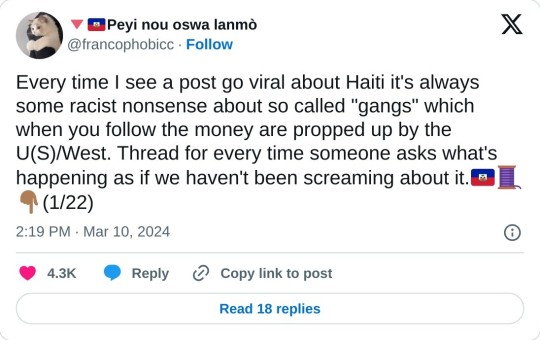
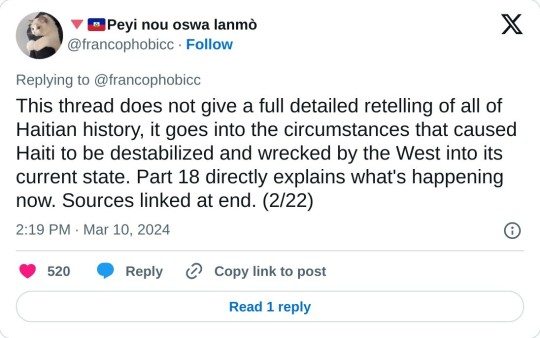
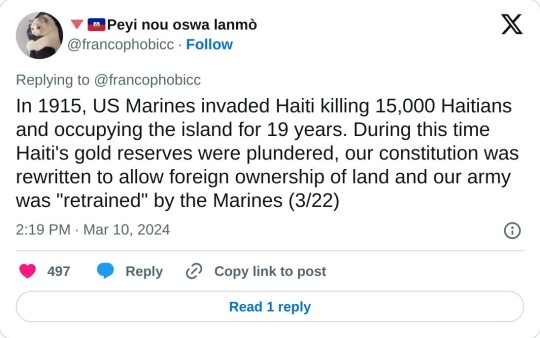
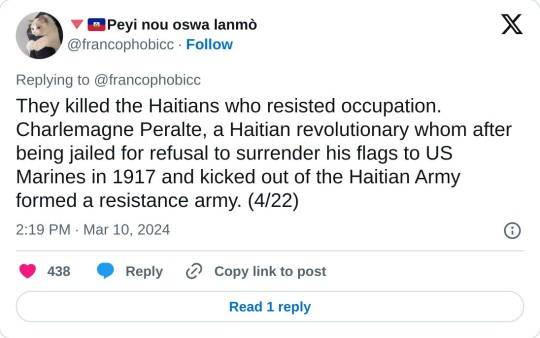
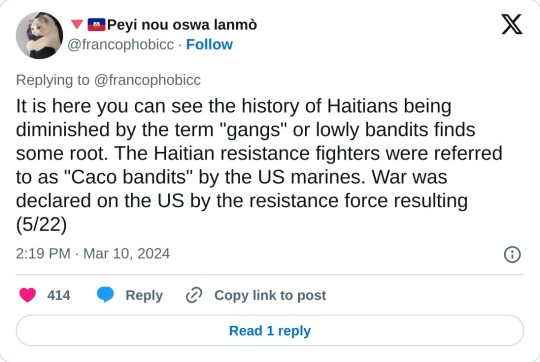
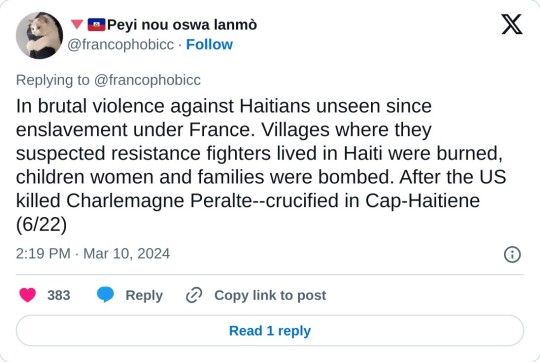
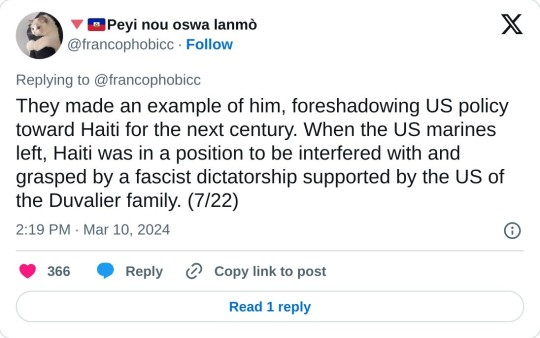
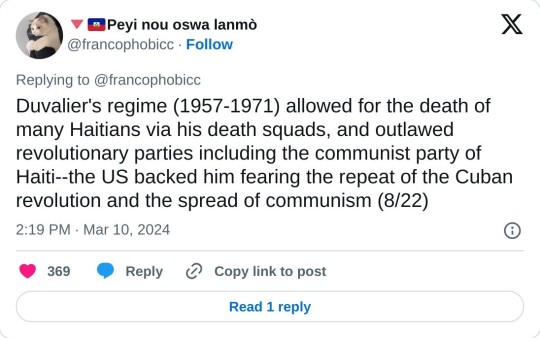

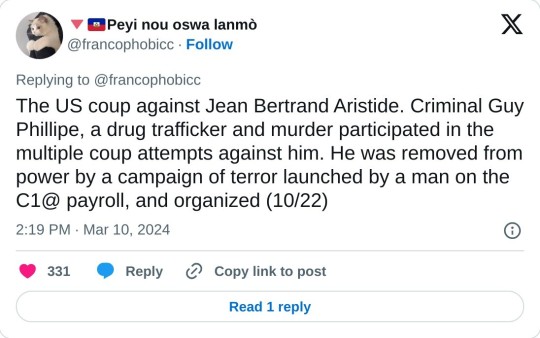

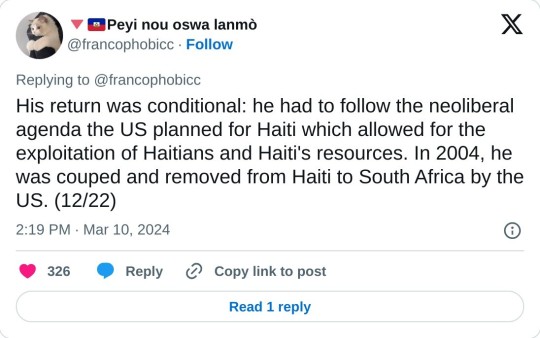
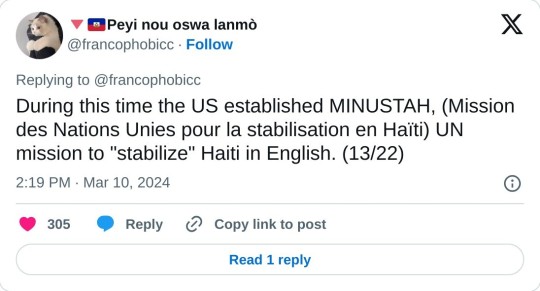

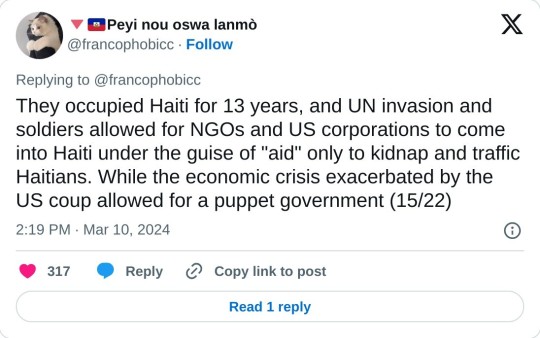
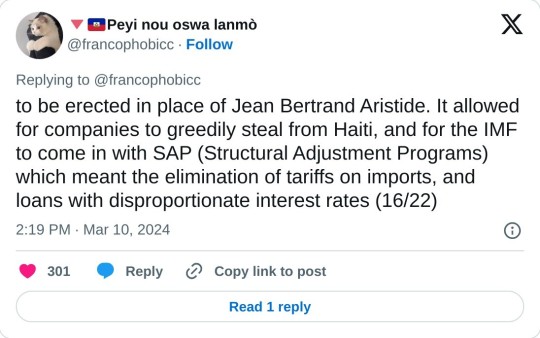
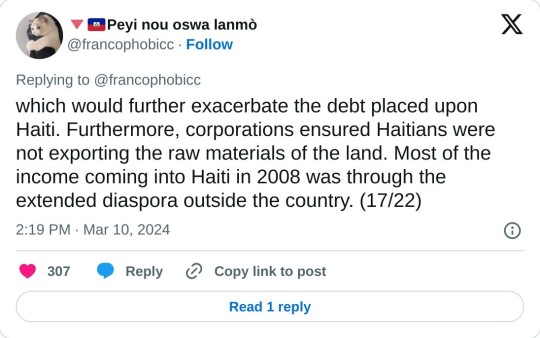
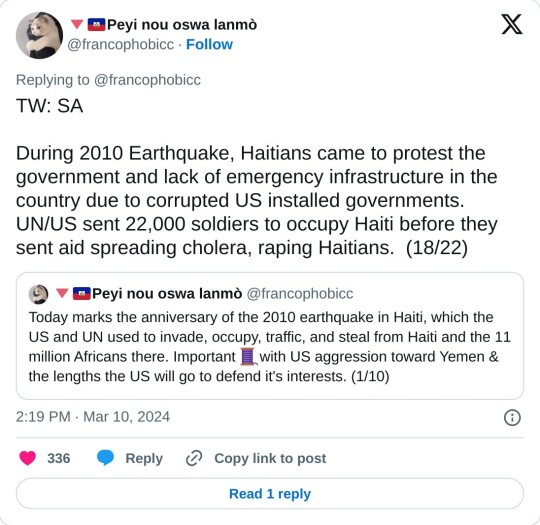


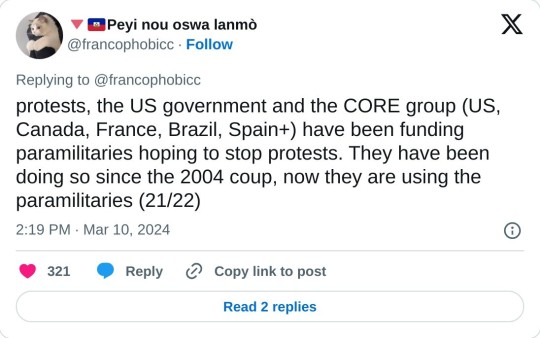
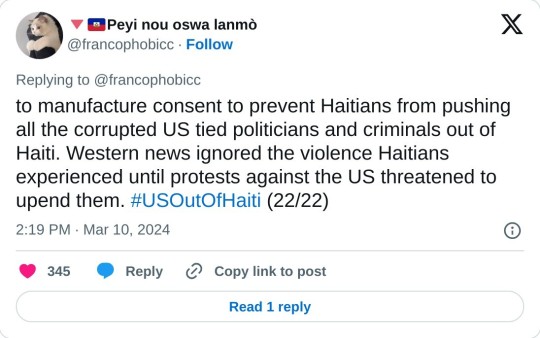
Resources OP provides:
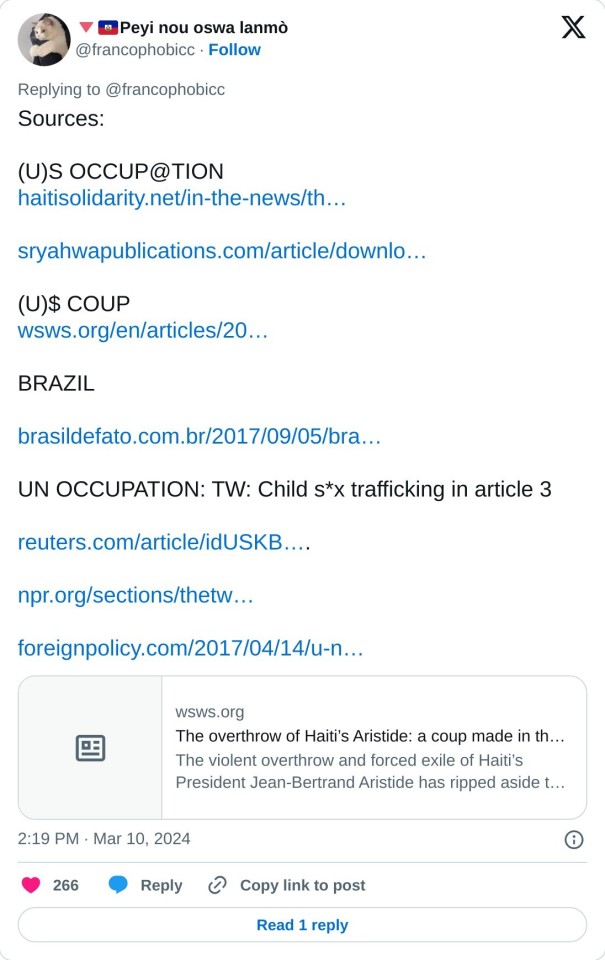
#feminist#social justice#current events#free haiti#haiti#haitian revolution#united states#france#brazil#history#united nations#us imperialism#western imperialism#us politics#us foreign policy#tw sa mention#USOutOfHaiti#us history#education
908 notes
·
View notes
Text
I think one of the things I appreciated the most about Nocturne was the protagonism on the Haitian Revolution.
This was a revolution that didn't just change Haiti, it changed the world. This was the revolution that would make the first black state. The first slaveless state. That would make every slave nation tremble with fear, from Europe To America to Asia to Oceania to Africa. It was what was never meant to happen, but did.
It's the nation that would defeat Napoleon and the British marine. Nobody could take down Haiti. You know why Napoleon went to colonize Europe? Haiti. That's why. He couldn't take down Haiti. Couldn't make it french territory again. So, he turned towards Europe.
We are talking about an undefeated nation.
AND! AND! A largely Vodu nation!
I was SO happy to see Vodu be portrayed as the wonderful religion it is, sacred and divinely intertwined with the Haitian revolution. The revolution was noted to start with Vodu chants and ritual.
White people refused to understand the link between the two worlds that could bring ancestors to meet their descendants. They created zombies as a horror trope. They made vodu dolls as a horror gimmick. They took a sacred religion and reduced it and vilanized it.
And I'm so happy to see it being positively portrayed in such a famous media. Vodu practicioners have already made media of the like. But I was positively surprised with what Nocturne had to present to us.
Of course, the knowledge that the french revolution was incomplete, that it was NOT FOR EVERYONE, is then again, something I really appreciate as a history student and a person. The french revolution killed mostly peasent and established the bourgeoisie, but did it end the Noir Code? No. Did it establish women's and black people's suffrage? No. Did it make a agrarian reform? No. Was it for the people? It had it's importance. But it was, at the very least, not for all the people.
And let's not forget that the french revolution's main intellectual current would birth biological racism, an unscientific current that claimed evidence of "different sized skulls" for example to prove humans possessed different races based on phenotypes.
Last, but certainly not least: it is absurd to see people claim that "all indigenous people have been killed". Acknowledging multi-ethnic indigenous genocide HAS to go along with the respect that there STILL are indigenous people and they continue their fight for their lives and land.
You know who the show demonstrates as such? Olrox.
While I don't appreciate the show claiming "all of his people were slaughtered" as that is historically inaccurate, I was most happy to see an Aztec vampire present and very alive, connected to his culture, protagonizing the show. The Nahua are still very much alive and kicking and I appreciated that the show took that into account.
And Annette! Sweet Annette being one of the leads makes me most joyful. I can't stand idiots that claim her presence.on France was """historically innacurate""", check again, dumbasses, free black people were all over France (especially the children of black Caribbean elites, for example, from Haiti back then known as Saint-Domingue, which did not possess universities and would sent their children to study in Europe.)
Anyway. To see her star as one of the leads made me so incredibly happy. She's a wonderful character and I appreciate how they let Annette be unapologetic and direct, especially during a moment between revolutions were she was very aware the french revolution didn't mean shit to her people.
But she was so lovely and to see her afro-caribean religion present AND source of her power made me emotional more than a few times.
Castlevania Nocturne really did hit this nail on the head.
Anyways. To make sure I give people answers to "but where's the evidence to x thing you said?" Here are my sources:
THYLEFORS, Markel; “Our Government is in
Bwa Kayiman:”A Vodou Ceremony in 1791 and
its Contemporary Significations, 2009
DUBOIS, Laurent; Avengers of the New World : the story of the Haitian Revolution, 2004
BUCK-MORSS, Susan; Hegel, Haiti and universal history, 2009
#Castlevania nocturne#Haitian revolution#French revolution#castlevania annette#richter belmont#castlevania netflix#maria renard#tera renard#castlevania edouard#olrox#castlevania olrox#castlevania spoilers#I'm just a history student who really likes Haitian history#and who's sick and tired to see people glorify the french revolution#like if you wanted a revolution that was truly liberating and radical and you know REVOLUTIONARY#the Haitian Revolution is RIGHT THERE#like HELLOOOOOO#and i'm so sick of seeing Vodu religion demonized#it's a beautiful religion and it shouldn't matter what you think of it#it deserves to be respected#we all have a responsibility in anti-racism and anti-religious oppression#so work
233 notes
·
View notes
Text
Why Edouard is my favorite character so far
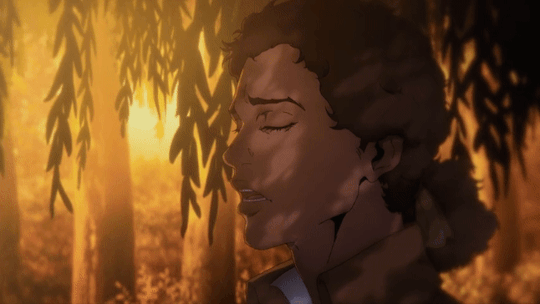
Okay, I gotta talk about this boy. Because gods, I love him so much.
While Castlevania has once again done it (meaning: I basically like all the important characters, with the exception of Erzsebet), Edouard is really my favorite. And I am gonna explain to you why.
First, of course, my inner bard is very happy about this boy singing all the time. I already talked about the importance of music and, fuck yeah, I am very much here for it.
But no, the reason why I love this boy so much is, that he so clearly goes against the grain to do what is right.
He is a free Black. For those who have not read my earlier blog about the Haitian Revolution: In Haiti they had three classes of people. Whites, Free Blacks and slaves. Free Blacks were often the kids (or grandkids) of the white owning class, and often were ery wealthy. Both things we see in Edouard.
But here is the thing: Most free Blacks were against the Revolution, where against abolition. Because their riches also depended on the slaves doing free work.
And here we have Edouard, who most certainly also profits in one way or another from slavery being a thing. And he not only helps slaves escape, but he also helps to organize and finance the revolution. He even is there in the fight, even though he is a fucking opera singer. He is no fighter. And still he is there. And when Annette gets send to Europe though Cecil's vision, he is just there by her side, even though he does not need to. Even though he has what appears to be a lover waiting for him.
And when he gets turned into a night creature he is just such a pure soul, that he does not loose himself. In fact, he finds out that he can bring some of the other creatures back. And when Annette in the end tries to free him, he stays, for the other night creatures.
Because he is just such a good man.
Gods, I love him.
#castlevania#castlevania netflix#castlevania nocturne#castlevania edouard#edouard#haitian revolution
288 notes
·
View notes
Note
Apologies if this is a somewhat irritating or strange question,but you think the claims of Robespierre opposing the abolition of slavery hold any weight? I've been attempting to research this myself and I often encounter information that seems contradictory in regards to both possibilities.
There are people who researched this in more detail and provided receipts. I believe @lanterne wrote about it?
Robespierre was pro abolition of slavery. As early as 1791, when many were "but oh no, if we abolish slavery, our economy will suffer! The colonies will be ruined!", Robespierre was like "then let them be ruined. Slavery is wrong and should not exist."
It is true though that the French government took its sweet time getting to the abolition of the slavery. It happened in february 1794, and only after the people of Haiti (Saint-Domingue) liberated themselves (or was at least clear that the slave uprising was successful). So they could have done it sooner, especially since the Convention was, nominally at least, all against slavery and pro abolition.
As I understand, the whole "Robespierre was against the abolition of the slavery" was due to an agent from Saint-Domingue (himself black or mixed) claiming that the abolition should not happen at that moment? So deputies (including Robespierre) took his word and acted on it, except that was a plant by the anti-abolition crowd and they later realized? I am not sure. Like I said, I am not an expert on what happened, but I know there was a stalling due to some misinformation.
If anyone knows more, please share! There were numerous posts about this exact thing with receipts but I can't remember what was said exactly and I can't find any of them.
70 notes
·
View notes
Text
On Haiti's 220th anniversary
Two hundred and twenty years ago, former slaves and free people of color accomplished the seemingly impossible: defeating one of the most formidable European armies of the day and establishing a new state where bondage, as it existed before 1791, would be forever abolished.
For those who have followed this blog since 2013, you know that I (admin A) have rarely allowed myself any sentimentality when discussing Haitian history. I have tried to present a nuanced portrait of Haiti’s past by addressing the weight of the many isms that have plagued its history (colonialism, racism, neoliberalism…) and by taking a critical look at the role of Haitian leaders throughout all these episodes.
Two hundred and twenty years after the unthinkable, Haiti finds itself without a president, grappling with what seems to be a permanent problem of armed gangs, little security, renewed multifaceted tensions with its Dominican neighbour, and on the brink of a new UN occupation through a Kenyan mission. The young woman who started this blog a decade ago would have said that there are little reasons for us as Haitians to celebrate—not because of a difficulty appreciating the great shoulders on which we stand, but because, at twenty-two years old, I didn’t believe in what I felt was useless romanticism binding us to a distorted past while also blinding us to the reality of the disastrous present.
Today, it’s not so much that I find much to rejoice in given the current state of affairs. It’s that I realize, what is the point of all this if there is no hope? Why this blog, why study the history of Haiti at all, why care about the country? For those of us with family there, why not temporarily send money in the hope of helping them relocate here, there, and anywhere except Haiti? Why not congratulate the complete erosion of Haitian sovereignty, as post-1986 Haiti, and especially Haiti of the last two decades, has shown so vividly the complete utter failure of its foreign-backed governing class?
I don’t know what hope is supposed to look like in this situation. Hope for what? Hope for a change under what conditions, under whose authority? On what would this hope be grounded? Perhaps, despite the best efforts of my twenty-two-year-old self, I am becoming as naive and sentimental as the people I silently criticized then...
Perhaps, however, I recognize that Haiti does matter. Even the most cynical among us would admit that there is something profoundly radical in breaking the bonds of slavery, in affirming that people of African descent could not be stripped of their humanity, that there is something poetic in saying “no” in the face of impressive odds. Newly independent Haiti did not live up to some of the promises of its complicated Revolution. The 1825 French imposition of an indemnity severely affected freshly formed Haiti (beyond the 19th century), but it does not excuse the incompetence of Haitian governments, then and now. Haiti could, may have, and I certainly hope, will change, will remember what 1804 ought to have meant.
Perhaps, especially for the people who currently live in Haiti, particularly the women of all ages who face the constant threats of sexual violence, Haiti has a responsibility to itself, to its unprecedented idealism, to all of us.
Given all these reasons, I find it necessary to maintain a guarded optimism, acknowledging that ideas hold significance and possess the potential to materialize into reality.
119 notes
·
View notes
Text
A LOT of y’all would have defended slavery, indigenous American genocide, and demonized the Black Panthers if you lived back then. The plight of the Palestinian people directly mirrors those crimes against humanity.
How do you THINK oppressed peoples have fought back? Genuinely.
For nonviolence to work, your opponent must have a conscience.
Colonial powers have none.
#06 speaks#haitian revolution#american slavery#indigenous resistance#free palestine 🇵🇸#anti colonialism
93 notes
·
View notes
Text
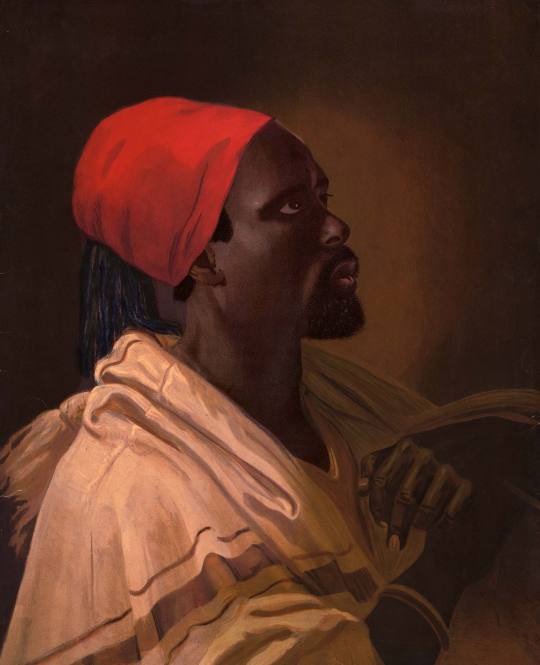
Toussaint L'Ouverture by George De Baptiste.
#George De Baptiste#haiti#République d'Haïti#Repiblik d'Ayiti#french revolution#jacobins#haitian revolution#Révolution haïtienne#Révolution française#black lives matter#Liberté ou La Mort
130 notes
·
View notes
Text
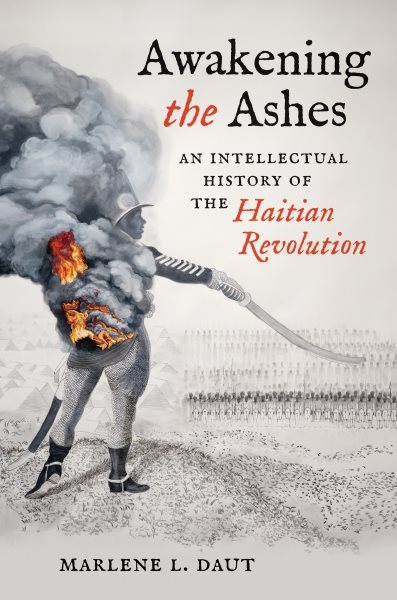
"Daut brings alive Haiti's fascinating intellectual history and shows brilliantly how Haitian thinkers shaped the culture and politics of their own country even as they transformed broader understandings of race, revolution, and the writing of history. This powerful and necessary book challenges us to think differently about the global history of thought."
23 notes
·
View notes
Text
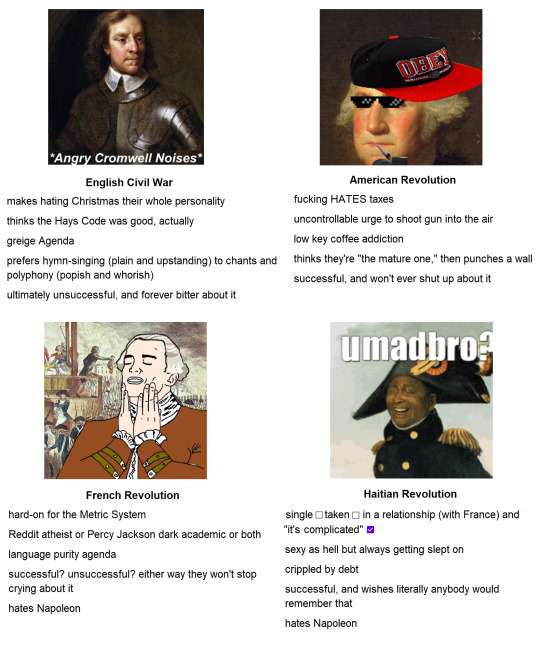
tag yourself: early modern revolutions
#this thousand year old meme format may be dead to YOU#but it lives on in my heart#i claim no credit for any of the meme pics of course#tag yourself meme#tag yourself#english civil war#the glorious revolution#oliver cromwell#american revolution#george washington#french revolution#maximillian robespierre#haitian revolution#toussaint louverture#history jokes#history humor#history memes
95 notes
·
View notes
Text
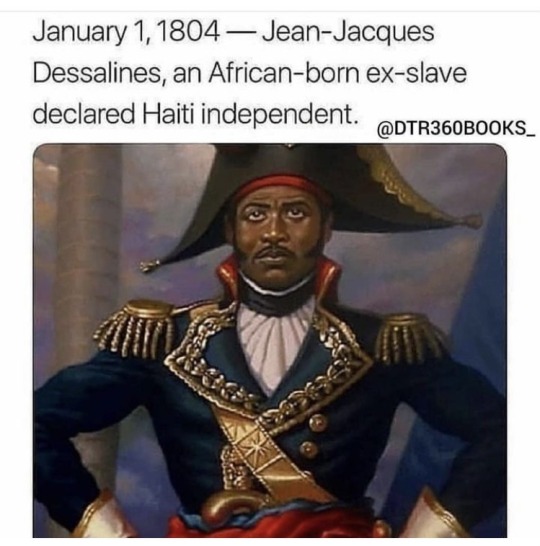
Papa Desalin 🇭🇹
202 notes
·
View notes
Text
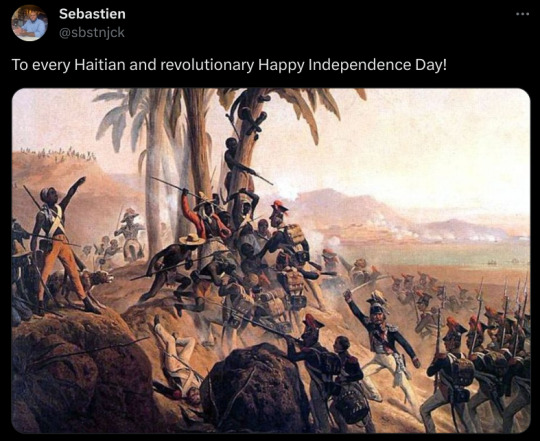
To every Haitian and revolutionary Happy Independence Day! [@/ sbstnjck. 01/01/24.] ❤️
44 notes
·
View notes
Text
JACOBIN FICTION CONVENTION MEETING 33: MADEMOISELLE REVOLUTION (2022)

1. The Introduction
Well, hello there, my dearest Citizens! Welcome back to Jacobin Fiction Convention! I missed you but, unfortunately, real life ™️ was a bit complicated yet again.
Either way, I’m back at it again, roasting analyzing historical fiction. Today’s “masterpiece” was graciously sent to me by @suburbanbeatnik in PDF form as a future review subject. And boy is it one hell of a ride.
Now, on paper, I was intrigued by a story of a Haitian biracial bisexual female protagonist, as there are many possibilities for that kind of story to unfold in a Frev setting.
Besides, it was written by an author who is promoting the #OwnVoices stories, which is a good intention in my opinion. Let’s see if the execution matches though.
(Spoiler alert: IT DOES NOT!)
Unfortunately, it looks like the book is only available in English at the moment and has to be purchased, mainly through Amazon. But maybe both of those things are for the best, since, upon finishing the book, I will be happy if it stays as contained and inaccessible to the wide audience as humanly possible.
Why? Well, more on that later.
This review will be longer than the ones I usually post, so please keep that in mind and grab some popcorn.
Also, it’s a very explicit book with scenes of sexual assault and gore. Goya’s “Disasters of War” and even “Innocent Rouge” levels of gore. So yeah, please be warned.
Anyway, this review is dedicated to @suburbanbeatnik , @jefflion , @lanterne , @on-holidays-by-mistake and @amypihcs . Love you, guys!
Now, let’s tear this sucker apart!!!
2. The Summary
The book follows the story of Sylvie de Rosiers, an aristocratic young woman born to a slave but raised by her plantation owner father as a free member of local nobility. Although not enslaved, Sylvie never felt truly accepted by the elites of Sainte Domingue.
However, following the outbreak of the Haitian Revolution, Sylvie and one of her half-brothers manage to escape to France, where another revolution is unfolding.
Intrigued by the ideas of Liberty, Equality and Fraternity, Sylvie must fight to find acceptance in this new context and carve out a place for herself.
Sounds interesting so far, right? Let’s see if the story lives up to expectations or not.
3. The Story
I have to admit that the first few chapters, the ones taking place on Haiti, were actually pretty good, or at least not bad. The pacing was good, the storyline building up to the uprising made sense and the introductions of the characters and the world building were fine.
Too bad that this lasted only for about four beginning chapters. The French chapters making up the bulk of the book were awful.
The characters suffer from assassination like they’re mafia snitches, the pacing turns into a speed run, the historical context isn’t explained well at all and the story rapidly stops making sense:
First Sylvie arrives and quickly meets Robespierre and the Duplay family, then becomes an ardent revolutionary, then flip flops between loving Eleonore Duplay and pining for Robespierre, then just so happens to meet Danton and Marat, then becomes a spy, then murders Marat… No, I’m not joking.
All of this is in the book with very little justification that makes sense. The worst part? The book isn’t stated as alternative history, so the author is very dishonest and presents everything in the book as actual history that is accurate to reality when it’s definitely not.
Oh, and flashbacks. The fucking flashbacks breaking immersion like a cat breaking a vase don’t help at all.
There’s also a ton of Thermidorian propaganda as well, so yeah… Fail.
4. The Original Characters
Let’s tackle the OCs first because the historical peeps deserve a separate category here.
First and foremost, I don’t like Sylvie as a character. She starts out as a vain spoiled brat growing up surrounded by privilege and luxury and openly looking down on slaves, especially on women.
Then she witnesses the execution of a rebel and very suddenly goes: “Fuck, slavery is awful!”, renounces her old ways, disowns her father and does a 180. It’s not written well though and is more like a teenage tantrum than character development.
Sylvie keeps flip flopping like this throughout the entire story too. Yay…
Oh, and she’s a Mary Sue. Everyone adores her except the villains, she’s able to charm her way through anything and obviously plays an important role in almost all of Frev! Robespierre even calls her The Mother of the Revolution at several points, even though she did nothing to earn that title.
She also pines for Robespierre for no reason at all, except for “he’s cool and charming I guess”, but in order to get closer to him, Sylvie Sue ™️ starts an intimate relationship with Eleonore Duplay.
So yeah, our protagonist manipulates another person (which is abuse) and plays Eleonore like a fiddle, but she also flip flops between only using Eleonore and actually loving her. Is Sylvie ever called out for that? Technically yes, but it gets resolved too quickly so it doesn’t count.
Also, Sylvie is INCREDIBLY selfish. She’s fine with manipulating Eleonore, fine with Charlotte Corday being executed for killing Marat (in the book Sylvie did it) and taking the blame… Again, everything revolves around Sylvie and she never gets called out on that either and never gets better.
She lacks consistent personality aside from those traits, however. She claims to want safety yet always takes the risky option and refuses to emigrate when it would help her obtain actual safety, for instance.
Gaspard, one of her half-brothers, is a much better character in my opinion, but still underdeveloped. But at least his journey from privileged fop to a revolutionary is less clunky. Too bad he dies with the Montagnards in the end.
Sylvie also has another half-brother, Edmond, who is cartoonishly evil and tries to murder Sylvie at one point.
Sylvie also has a standard issue evil stepmother who is eager to marry her off and thus get rid of her but at least has enough decency to not be actively malicious.
Her dad is loving, but painfully ignorant.
Sylvie’s aunt Euphemie de Rohmer is a good character, always looking out for Gaspard and Sylvie. She does emigrate to London during the reign of terror though.
Okay, now let’s discuss the historical figures.
5. The Historical Characters
I know that I usually don’t discuss accuracy, but an exception must be made here.
Maximilien Robespierre seems to undergo a typical “character arc” of “actual revolutionary turned ruthless dictator”. He is also one again coded as asexual and thus shown as not giving two shits about his lover, Eleonore Duplay. He tries to marry Sylvie for political reasons only later in the book and it’s all but stated that he condones all the violence going on and is called a hypocrite multiple times. Oh, and he also kisses Sylvie without her consent… Err… DID SIVAK CONFUSE HIM FOR DANTON?!!! Okay, one sec…

(Shows up with a bloody face) Okay, let’s continue…
Eleonore Duplay is a promising artist who is fiercely loyal to Robespierre but cheats on him with Sylvie and later turns out to be a member of a women’s secret society that is trying to curb the terror. She’s on board with murdering Marat and is also friends with Olympe de Gouges and Charlotte Corday. Wtf?!
(Checks that the antidepressants didn’t cause a hallucination)
Elisabeth Duplay falls in love with Gaspard and her marriage to Le Bas is portrayed as arranged by Robespierre to “reward” Le Bas for being a loyal Jacobin, but at least she is relatively happy in said marriage. Uhm, okay…
Olympe de Gouges and Charlotte Corday are portrayed as basically saints and also part of the secret society.
Corday in particular is willing to sacrifice herself for the sake of France and Sylvie is fine with that because, apparently, Corday has nothing to live for anyway but Sylvie does.
It’s not like in reality Corday actually had a family and Girondist friends or anything so yeah, TOTALLY OKAY to throw her under the bus amirite?!
Danton, luckily, is portrayed fairly accurately as a crass womanizing brute so at least that’s correct.
Marat is a stereotypical bloodthirsty monster who is supposed to be very smart yet acts like an idiot in the presence of our dear Sylvie Sue.
Charlotte Robespierre makes exactly one cameo and acts like a total ass to both Duplay sisters and to Sylvie (who she just met). Don’t get me wrong, Charlotte was at odds with the Duplay family but not all of them and certainly she wasn’t a bitch to every single fucking stranger.
Augustin Robespierre is merry, a gentleman, loyal to his ideas but also a part of that secret society and also supports the idea of offing Marat. Nice…
Surprisingly, Henriette Robespierre makes a cameo alongside Charlotte and also acts like an ass but at least less so than Charlotte. Except she shouldn’t even be in the book because the cameo happens in 1792, yet Henriette died in 1780. So it’s either a ghost or the author doesn’t care. I’m kind of inclined to believe the latter.
Where are Camille Desmoulins and Saint-Just, you may act? ABSENT, believe it or not! No, I’m not kidding! They’re nowhere to be seen for some reason!!! I have no idea why. They’re not even fucking mentioned!!!
Anyway, let’s move on before I lose my sanity.
6. The Setting
Again, the first chapters are much better than the rest. In the majority of the book the descriptions are not that great and the world building is laughably inaccurate, to the point that, if I were told that it’s a joke fanfic, I’d have believed it instantly!!!
7. The Writing
Thankfully, there’s no “First Person Present Tense” bullshit, but the writing is still full of problems. The aforementioned flashbacks are just one problem, but there are others.
For example, extremely clunky use of French. I’m the beginning of every chapter we get a date and the months are in French. This would’ve been fine but gets ridiculous in cases like “early avril 1793”. What’s wrong with writing “early APRIL”?!
Oh, and in another instance, the houses of families are called “Chez + Family name”, like Chez Rohmer and Chez Marat. It gets weird when the text has phrases like “went at Chez Marat”. Chez already means “at” in this context, so it’s extremely redundant and a damn eyesore. Wouldn’t it be better to say “Went to Marat’s apartment”? Apparently, not for Zoe Sivak!
Also, the author describes all the brutal and gory scenes of executions and torture at an alarming length and with a concerning amount of details, to the point that I got very uncomfortable despite not being squeamish most of the time.
8. The Conclusion
Phew, it’s finally over. As you may have guessed, I don’t recommend wasting your time and money on this pile of trash.
A 13-year old here on tumblr can write a better novel than whatever the fuck this author published.
It’s poorly researched with inaccuracies that even a quick Wikipedia search could fix, the protagonist is an awful Mary Sue, the historical characters get constantly fucked over… so yeah, please skip this shit.
Anyway, on that note, let’s conclude today’s meeting. I think I might need time to recover from reading this book…
Stay tuned for updates!
Love,
Citizen Green Pixel.
#obscure frev media#frev media#frev books#jacobin fiction convention#mademoiselle revolution#french revolution#haitian revolution#charlotte corday#charlotte robespierre#henriette robespierre#augustin robespierre#maximilien robespierre#elisabeth duplay#eleonore duplay#philippe le bas#jean paul marat#georges danton
84 notes
·
View notes
Text
By Stephen Millies
July 14 is Bastille Day. On that date in 1789 tens of thousands of poor people in Paris attacked a hated prison called the Bastille and began the French Revolution. The continual intervention of poor people in the cities and countryside — particularly in Paris — drove the revolution forward.
The French Revolution started in Europe, but it belongs to the world. And there would have been no French Revolution without Haiti.
#Haiti#French Revolution#Bastille Day#Paris#workers#white supremacy#colonialism#slavery#Haitian Revolution#Karl Marx#Frederick Engels#Struggle La Lucha
49 notes
·
View notes
Text
“violence is never the answer” = support for the violence of the status quo
#reaux speaks#free palestine#palestine#israel#violence#hamas#resources#undescribed#history#haitian revolution#french revolution#algerian revolution#bipoc#genocide#ethnic cleansing
22 notes
·
View notes
Text
White bitches on TikTok calling the Haitian Revolution white genocide. Summon the ancestors and curse these bitches.
9 notes
·
View notes

